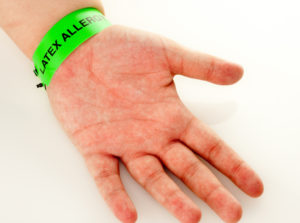What to Do if You Have Developed a Latex Allergy

While some people are allergic to latex from birth, this type of allergy can also be the result of being repeatedly exposed to latex. If you know or believe you have a latex allergy then we strongly recommend you take action now. This allergy can turn from an annoyance to a life-threatening issue faster than you think.
Read on to learn more about latex and other allergies. If you want to be tested for allergies to find out if you need help, contact Allergy, Asthma, and Immunology Medical Group at 805-658-9500 to make an appointment.
The cause of latex allergies
Natural rubber latex has certain proteins in it that can result in allergic reactions. Those who work in the healthcare industry are most likely to develop a latex allergy over time. Others who work in industries that require the use of gloves are also at an increased risk of a latex allergy. This includes housekeepers, hairdressers, food service workers, etc. The Centers for Disease Control and prevent find that up to 10% of healthcare employees in the U.S. have at least a sensitivity to latex.
Risk factors for developing a latex allergy
In addition to repeated exposure to latex, there are other risk factors that can make a person more likely to develop a latex allergy. People who have food allergies, have had several surgeries, have defective bone marrow cells, have had urinary tract infections, or have another type of allergy such as asthma or eczema are all at higher risk of developing this allergy.
A person does not have to touch latex to be exposed
Once a person has developed a latex allergy, they do not have to actually touch rubber latex to have a reaction. For some, simply inhaling the powder in these gloves, being exposed to rubber latex through mucous membranes, or having their blood exposed to latex via medical devices with rubber can result in life-threatening allergic reactions.
Typical symptoms of latex allergies
A person who has what’s known as contact dermatitis, which is a mild allergic reaction, will experience symptoms such as burning, dryness, itching, lesions, and scaling on the area that was exposed to latex. Others can have more severe allergic reactions which involve similar symptoms but more severe and for longer periods of time.
Latex hypersensitivity, which is also referred to as an immediate allergic reaction to latex, can result in symptoms that mirror those of hay fever. It can also cause hives, cramps, tremors, itching, conjunctivitis, and even difficulty breathing. Patients also sometimes report a rapid heartbeat, shortness of breath, and chest pain. In the worst situations, life-threatening anaphylactic shock can take place.
A latex allergy is a serious issue. It may start out as a minor annoyance but it is essential to get help if you believe you have a sensitivity or allergy to latex. You can get help by contacting Allergy, Asthma, and Immunology Medical Group at 805-658-9500 today.



